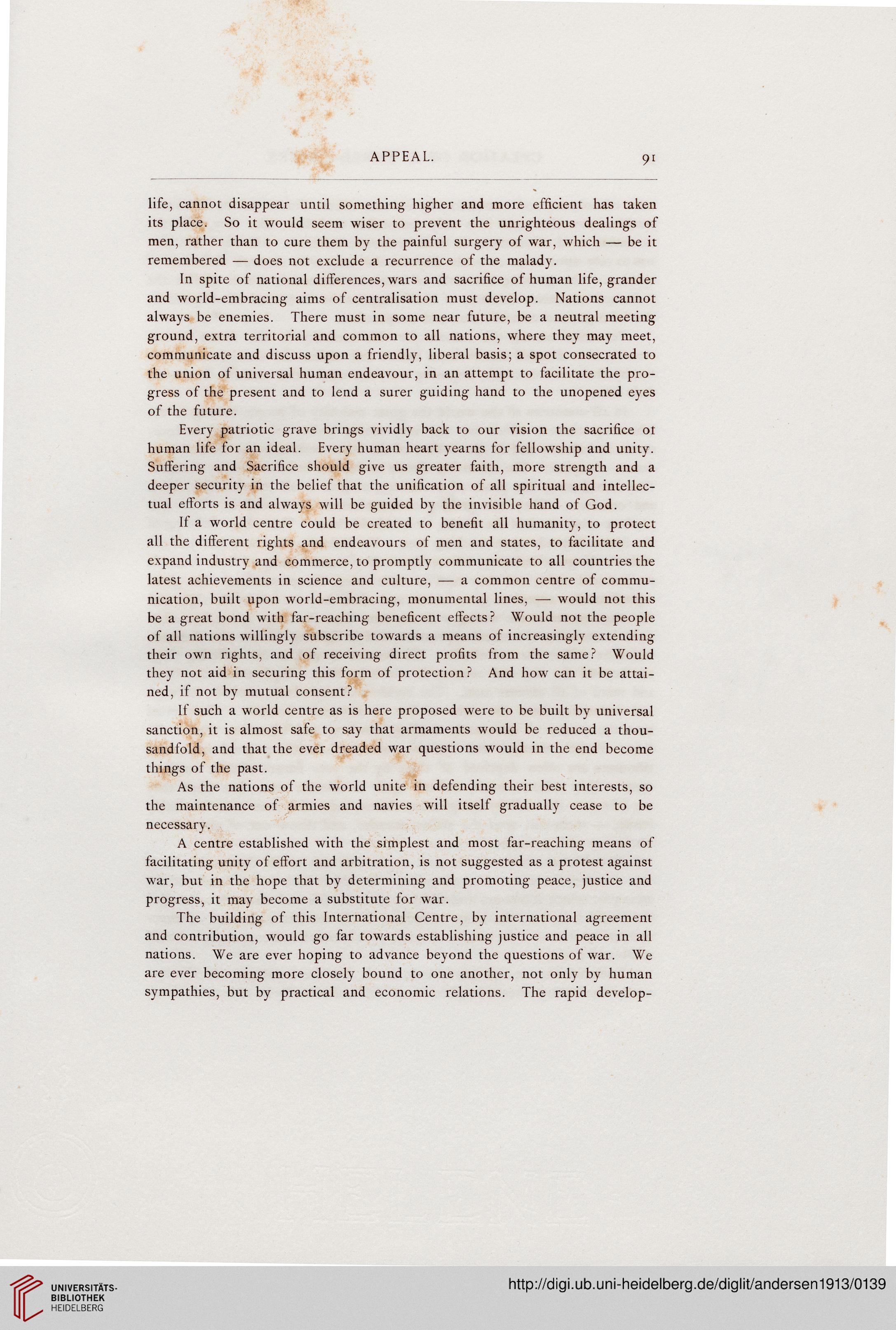APPEAL.
91
life, cannot disappear until something higher and more efficient has taken
its place. So it would seem wiser to prevent the unrighteous dealings of
men, rather than to cure them by the painful surgery of war, which — be it
remembered — does not exclude a recurrence of the malady.
In spite of national differences, wars and sacrifice of human life, grander
and world-embracing aims of centralisation must develop. Nations cannot
always be enemies. There must in some near future, be a neutral meeting
ground, extra territorial and common to all nations, where they may meet,
communicate and discuss upon a friendly, liberal basis; a spot consecrated to
the union of universal human endeavour, in an attempt to facilitate the pro-
gress of the present and to lend a surer guiding hand to the unopened eyes
of the future.
Every patriotic grave brings vividly back to our vision the sacrifice ot
human life for an ideal. Every human heart yearns for fellowship and unity.
Suffering and Sacrifice should give us greater faith, more strength and a
deeper security in the belief that the unification of all spiritual and intellec-
tual efforts is and always will be guided by the invisible hand of God.
If a world centre could be created to benefit all humanity, to protect
all the different rights and endeavours of men and states, to facilitate and
expand industry and commerce, to promptly communicate to all countries the
latest achievements in science and culture, — a common centre of commu-
nication, built upon world-embracing, monumental lines, — would not this
be a great bond with far-reaching beneficent effects? Would not the people
of all nations willingly subscribe towards a means of increasingly extending
their own rights, and of receiving direct profits from the same? Would
they not aid in securing this form of protection? And how can it be attai-
ned, if not by mutual consent?
If such a world centre as is here proposed were to be built by universal
sanction, it is almost safe to say that armaments would be reduced a thou-
sandfold, and that the ever dreaded war questions would in the end become
things of the past.
As the nations of the world unite in defending their best interests, so
the maintenance of armies and navies will itself gradually cease to be
necessary.
A centre established with the simplest and most far-reaching means of
facilitating unity of effort and arbitration, is not suggested as a protest against
war, but in the hope that by determining and promoting peace, justice and
progress, it may become a substitute for war.
The building of this International Centre, by international agreement
and contribution, would go far towards establishing justice and peace in all
nations. We are ever hoping to advance beyond the questions of war. We
are ever becoming more closely bound to one another, not only by human
sympathies, but by practical and economic relations. The rapid develop-
91
life, cannot disappear until something higher and more efficient has taken
its place. So it would seem wiser to prevent the unrighteous dealings of
men, rather than to cure them by the painful surgery of war, which — be it
remembered — does not exclude a recurrence of the malady.
In spite of national differences, wars and sacrifice of human life, grander
and world-embracing aims of centralisation must develop. Nations cannot
always be enemies. There must in some near future, be a neutral meeting
ground, extra territorial and common to all nations, where they may meet,
communicate and discuss upon a friendly, liberal basis; a spot consecrated to
the union of universal human endeavour, in an attempt to facilitate the pro-
gress of the present and to lend a surer guiding hand to the unopened eyes
of the future.
Every patriotic grave brings vividly back to our vision the sacrifice ot
human life for an ideal. Every human heart yearns for fellowship and unity.
Suffering and Sacrifice should give us greater faith, more strength and a
deeper security in the belief that the unification of all spiritual and intellec-
tual efforts is and always will be guided by the invisible hand of God.
If a world centre could be created to benefit all humanity, to protect
all the different rights and endeavours of men and states, to facilitate and
expand industry and commerce, to promptly communicate to all countries the
latest achievements in science and culture, — a common centre of commu-
nication, built upon world-embracing, monumental lines, — would not this
be a great bond with far-reaching beneficent effects? Would not the people
of all nations willingly subscribe towards a means of increasingly extending
their own rights, and of receiving direct profits from the same? Would
they not aid in securing this form of protection? And how can it be attai-
ned, if not by mutual consent?
If such a world centre as is here proposed were to be built by universal
sanction, it is almost safe to say that armaments would be reduced a thou-
sandfold, and that the ever dreaded war questions would in the end become
things of the past.
As the nations of the world unite in defending their best interests, so
the maintenance of armies and navies will itself gradually cease to be
necessary.
A centre established with the simplest and most far-reaching means of
facilitating unity of effort and arbitration, is not suggested as a protest against
war, but in the hope that by determining and promoting peace, justice and
progress, it may become a substitute for war.
The building of this International Centre, by international agreement
and contribution, would go far towards establishing justice and peace in all
nations. We are ever hoping to advance beyond the questions of war. We
are ever becoming more closely bound to one another, not only by human
sympathies, but by practical and economic relations. The rapid develop-




